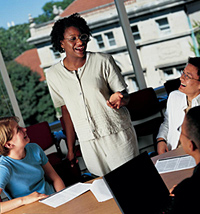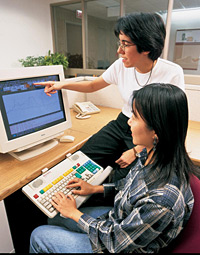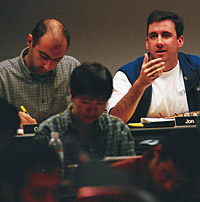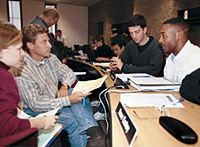| |
 |
| |
 |
| |
|
The
Spirit of Kellogg
Kellogg's
"culture of innovation and excellence" keeps teaching
and research in the spotlight, allowing the school's faculty,
students and corporate friends to share the excitement of
academic innovation
By Matt Golosinski
George Bernard Shaw once quipped, "He who can, does.
He who cannot, teaches." The famous playwright would
be puzzled, however, by the vitality of scholarship at Kellogg,
where Shaw's wit meets its match in the Kellogg School faculty.
The Kellogg faculty are a distinguished group of educators
who certainly do teach, and do it well, according to student
evaluations and stellar national rankings. But the faculty's
academic mission encompasses more than teaching. These professors
also engage in cutting-edge research across disciplines -
research that holds theoretical and practical importance for
today's business world.
"We look around for the ivory here and a lot of times
we don't see it," jests Associate Dean for Academic Affairs
David Besanko (read full interview),
the Alvin J. Huss Distinguished Professor of Management and
Strategy. In his administrative role - a position shared with
colleague Robert Magee (read full
interview), the Keith I. DeLashmutt Distinguished Professor
of Accounting Information and Management — Besanko oversees
curriculum and teaching in the dean's office, while Magee
coordinates the school's faculty and research. Like many of
his peers, Besanko perceives the connection between the real-world
marketplace and the world of academics at Kellogg. "Research
has always been a preeminent part of this institution,"
he says.
| |
 |
| |
© Nathan Mandell
|
| |
Assistant
Professor Katherine Phillips leads a discussion in her
management organizations class. |
| |
|
As Besanko
suggests, this research does not exist in the vacuum of an
ivory tower. It's part of a dynamic web of interactions that
includes students and senior executives as well as databases,
academic journals and professional conferences.
Some of this research has proven groundbreaking, transforming
entire disciplines. For instance, Kellogg has been instrumental
in developing marketing into a mature academic field. Similarly,
game theory and dispute resolution were in no small part advanced
by the vision of Kellogg faculty. Departments across the school
can also boast of significant contributions in areas as disparate
as family enterprise, management and strategy, accounting
and finance.
"We are a school with six strong departments," insists
Besanko, while acknowledging Kellogg's perennial reputation
as a marketing powerhouse. Lakshman Krishnamurthi (read
full interview), the A. Montgomery Ward Professor of Marketing
and chair of that department, agrees. "Kellogg has been
among the top three business schools for the last 12 years,"
he says. "You can never be ranked at that level without
being really exceptional in every department."
What makes Kellogg a special place for researchers regardless
of departmental affiliation is the administration's commitment
to recruiting and retaining the best scholars, and then encouraging
them to collaborate freely both inside and between departments
so long as the results are first-rate.
With apologies to Bernard Shaw, these are teachers who can,
and who do. Indeed, teachers are the ones running the school.
Excellence starts at the top
Led by Dean Dipak C. Jain, the Kellogg administration views
research as an engine that drives management education. The
Office of the Dean not only ensures that research continues
to flourish at Kellogg, but the office itself models the school's
commitment to scholarship. Jain, Besanko and Magee are all
celebrated scholars in their own rights (in marketing, strategy
and accounting, respectively), and all three continue their
research and teaching while serving as administrators.
As Distinguished Professor of Management and Organizations
Edward Zajac (read full interview)
puts it, "We have a culture here where everyone does
research." It's this arrangement that Magee says sends
a powerful message to professors looking to advance their
careers in an environment that simultaneously nurtures and
challenges them. "Our culture itself is a recruiting
tool," says Magee.
Indeed, culture is an integral part of Kellogg, now more than
ever. "Scholarship comprises one-third of what we call
Kellogg's 'Culture of Innovation and Excellence,'" says
Jain, referencing a paradigm that lays out the strategic vision
of his office. "We are dedicated to creating path-breaking
knowledge that defines and shapes the business and management
fields."
In addition to scholarship, Kellogg emphasizes the importance
of partnership and leadership, though Jain explains that these
three components are really interconnected, the school's dynamic
spirit arising as a result of the synergy among these elements.
The dean views partnership with faculty, staff, students,
alumni and corporate friends as essential to Kellogg's mission
of delivering an exemplary educational experience. At the
same time, Jain stresses the importance of leadership at all
levels of the school - including the classroom, where faculty
provide students with a well-rounded academic experience,
one that, in Jain's words, "combines rigor, relevance
and the opportunity to develop the personal and people skills
needed to be a successful leader in a global, knowledge-based
economy."
With 18 research centers studying phenomena from family enterprise
to biotechnology to nonprofit organizations to ethics, Kellogg
puts Jain's words into action.
 |
|
|
|
|
| Cutting-edge
technology plays an important educational role in both
faculty and student research. |
|
| |
|
Strength
attracts strength
Delivering on this academic promise demands that the school
create an environment to attract and retain the best faculty,
and then give them the tools and intellectual freedom to perform
at their best. Kellogg achieves these goals in a variety of
ways. It offers its professors ample resources for research,
including adequate funding and access to the latest technology.
Even more than that, Kellogg offers its people the most valuable
resource of all: each other.
The school encourages collaboration among its faculty through
the structure of the tenure and promotion process, which gives
full, rather than partial, publication credit to researchers
who co-author scholarly work with their peers.
"This policy is a critical part of our research culture,"
says Magee. "It means that faculty are eager to work
together and embrace new professors who come into the school."
Professor Daniel Diermeier (read full
interview) agrees. The IBM Professor of Regulation and
Competitive Practice considers the cooperative spirit among
Kellogg faculty a principle reason the school enjoys the academic
reputation it does.
"Departments are very important here," says Diermeier,
a philosopher and political scientist by training who researches
legislative politics and game theory models in politics, and
who was awarded Kellogg's Best Teacher award for 2000. "We
have a very strong disciplinary basis, and that makes Kellogg
different from other business schools. The secret is to have
faculty who are absolutely first-rate in their disciplines
and then put them in an environment where they can participate
in interdisciplinary work. Then exciting things can happen."
This research environment is "awesome," says Distinguished
Professor of Decision and Game Sciences Ehud Kalai (read full
interview), adding that the school's culture proves so
inviting that Kellogg "constantly gets requests from
researchers who want to move here, or at least visit in order
to gain knowledge."
Part of what builds this interest in the school involves the
way Kellogg enhances existing departments and creates new
ones. Faculty hiring represents the key to establishing this
strength around the school, although the situation presents
a chicken-and-egg dilemma. "If you've got strength in
a department, it's easy to build on strength," explains
Mark Satterthwaite,
the Earl Dean Howard Professor of Managerial Economics, whose
research encompasses microeconomic theory, industrial organization
and health economics. "There's a network dynamism operating
in terms of faculty members influencing each others' research.
You're smarter because of your colleagues."
 |
|
©2001
Nathan Mandell
Student participation in classrooms is typical of the
dynamic structure of Kellogg academics. |
|
Challenging
each other
This collegiality results in faculty mentoring - mentoring
both students and each other. Because of the school's cooperative
culture, senior Kellogg professors work closely with younger
peers, leading to better scholarship for everyone involved.
Younger faculty benefit from the experience of their more
seasoned colleagues, while the tenured professors enjoy the
fresh ideas and enthusiasm of junior professors. Each challenges
the other to excel.
Examples abound to demonstrate the merits of this arrangement.
One noteworthy instance includes that of Assistant Professor
of Marketing Robert V. Kozinets (read full
interview), who has worked with John Sherry, a
professor of marketing and a trained anthropologist who has
been part of the Kellogg faculty since 1984. Sherry has explored
consumer behavior and is highly regarded as a postmodern consumer
researcher.
"I was very fortunate to have John as a mentor, in addition
to several other Kellogg peers," says Kozinets, a media
and entertainment management expert who joined Kellogg in
1997. Since then, he has worked on cutting-edge projects both
independently and with Sherry, including ethnographic and
videographic forays to study consumer behavior in settings
as diverse as NikeTown and the Burning Man festival, an arts
community that springs up for one week every year in the Nevada
desert. Says Kozinets, "I've had the benefit of colleagues
who are doing world-class research in communications studies
and sociology. We get a lot of institutional support for our
research. I feel wonderful about the way Dean Jain and his
office have really put research out front and helped demonstrate
its usefulness to the students, business community and the
public."
Artur Raviv isn't
surprised by this collegiality. The Alan E. Peterson Distinguished
Professor of Finance has seen faculty partnerships flourish
at Kellogg since he arrived in 1985. Raviv, an award-winning
teacher and expert in corporate finance and information economics,
considers himself and his Kellogg peers "academic entrepreneurs"
who are driven to produce by innate intellectual curiosity
and passion, rather than simply the desire to obtain tenure.
"Through your research you are compelled to guide your
younger colleagues and to produce important contributions
that affect your profession," says Raviv. "It's
an exciting intellectual environment here. Innovation is everywhere
at Kellogg."
Real-world connections
| |
 |
| |
© Nathan Mandell
|
| |
Students
meet in small groups to discuss a class project. |
| |
|
Kellogg's
innovative academic initiatives include making faculty research
widely available. The school achieves this goal in three key
ways: research centers, scholarly publications, and executive
education.
The importance of balancing theory and practice has long been
a hallmark of Kellogg's approach to academics. Nowhere is
this balance more evident than in the school's commitment
to bringing cutting-edge research to the public and the business
community through its research centers. With new centers opening
every year-Kellogg most recently launched the Center for Executive
Women, the Center for Financial Institutions and Markets,
and the International Business & Markets Research Center-the
school continues to bring valuable strategic information to
the management world.
"Our research centers serve as catalysts for our own
faculty, but also for faculty from peer schools who participate
in the scholarly activities hosted by these centers, including
seminars and conferences," says Jain. "The centers
bring theory and practice together in powerful ways."
Theory and practice certainly met during the history of Kellogg's
Dispute Resolution Center (DRRC). Headed by Professor Jeanne
Brett (read full interview), an expert
in cross-cultural negotiations, the DRRC has, since its inception
in 1986, funded research in competitive decision-making, negotiations
and conflict resolution. Brett herself has produced groundbreaking
work in dispute resolutions involving highly volatile labor
management environments.
"The DRRC has generated research that has kept Kellogg's
management and organizations classes at the forefront of knowledge,"
says Brett. "We've studied how biases affect negotiators'
decisions, how negotiators learn and how culture affects negotiators'
preferences and strategies."
The research centers contribute much that's valuable for business
and education leaders. So too do Kellogg's scholarly publications
- an aspect of the school that the dean's office intends to
develop even further. "Textbooks are one of the ways
our professors can create a legacy and make manifest the products
of their knowledge," says Besanko. "This is an area
in which we will continue to encourage our faculty to excel."
Excellence has also manifested itself in Kellogg's Executive
Education program, arguably the most direct way the school
disseminates its research and bridges theory and practice.
Ranked No. 1 in the nation by Business Week, Kellogg's
executive education curriculum has impacted thousands of senior
corporate leaders by giving them the cutting-edge tools to
make immediate, practical decisions in their organizations.
"When I teach in our Executive Education courses, I find
that students really enjoy and appreciate the intellectual
frameworks based on our research," says Zajac, a strategic
alliances expert who has won the school's Sidney J. Levy Award
for Excellence in Teaching.
Whether the students are enrolled in the full- or part-time
MBA program, or the executive program, they can expect a world-class
management education experience from Kellogg, says Zajac.
And they can expect teachers who are dedicated to teaching
and research, and who are committed to getting this information
into the hands of their students. "I live and breathe
this business," says Krishnamurthi. "I teach, I
research, I consult, I read all the time. I bring this passion
into the classroom."
Admittedly, negotiating between roles as researcher and teacher
isn't always easy, but professors like Diermeier understand
the importance of delivering excellence on all fronts. "The
students I'm teaching are the ones who are going to run the
corporations," he says. "These are the next generation
of business leaders. As a teacher, this makes you aware of
the profound responsibility you have. What an incredible opportunity."
Learn
more about Kellogg
faculty research mentioned in this article and read
detailed transcripts
of interviews with faculty.
|



